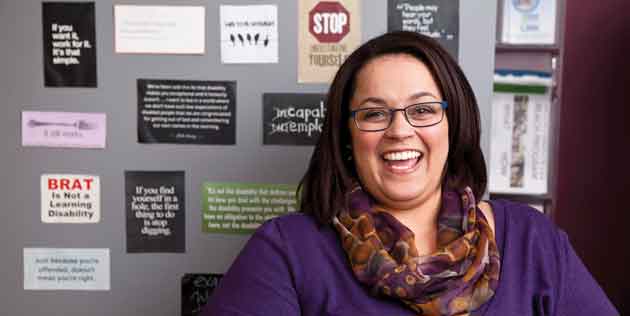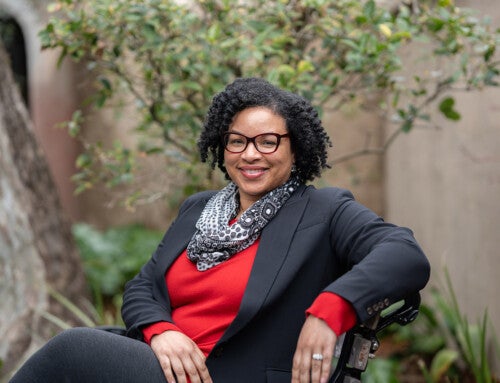If you don’t have the time or money for a therapist, consider walking by room 245 in the Robert Scott Small Building. There you’re bound to encounter a bunch of quotable wisdom to help set you straight, advice that will teach self-reliance and boost confidence.
On the door of room 245, you just might see quotes like
“BRAT is not a learning disability.”;
“If you want it, work for it. It’s that simple.”; and
“You don’t need a reason to help people.”
The sometimes sharp-edged wisdom comes courtesy of Lisa Christian ’09, a coordinator for the College’s REACH Program, which helps students with mild intellectual and developmental disabilities earn a college certificate.
Specifically, Christian helps upperclassmen learn to manage their finances and prepare for life after college, including learning how to apply for jobs and start a career. Through Christian’s help, graduating REACH students prepare a portfolio and résumé before beginning their job hunt.
This hard work pays off, says Christian, as 75 percent of the graduates from the REACH Program have found work since graduation. (The College’s REACH Program graduated its first class in 2014.)
At first blush, some of the posts on Christian’s door can seem confrontational (e.g., “This is not a daycare, it’s a university”). Yet a closer study reveals the quotes to be well intentioned and extremely relevant to the students she is helping to launch into life beyond the College. After all, Christian would be doing students a disservice if she sugarcoated the post-adolescent challenges that loom for any young adult.
Christian’s disposition for dispensing tough love came in handy during a previous job as a detention officer at the Charleston County jail. There she established a good rapport with inmates, she says, leaving judgment to other parts of the legal system.
“I’m a meet-you-where-you’re-at person,” says Christian, who grew up in Queens, New York. “I’m not projecting where you should be.”
After a back injury ended her career in criminal justice, Christian brought her same, practical demeanor to work at the College’s REACH office, where she interned while earning a master’s degree in social work from the University of South Carolina. She is about finding future solutions for REACH students, and not dwelling on past or present problems.
“If we all sit around and commiserate no one is moving forward,” says Christian. “I’m the person who says, ‘What can we do about that?’ I’m the solution-focused person.”
She credits her colleagues in the REACH office for creating a “real, comprehensive approach of support” for students, mentioning the years of experience her coworkers have accrued, as well as their advanced degrees and certifications in special education and counseling.
“We’re a well-rounded team,” says Christian.
And while only a handful of students are fortunate enough to receive intensive, hands-on instruction from Christian, anyone can benefit from the wisdom Christian chooses to share on her office door.
Sure, paper posted to a door can’t make miracles happen, but the messages contained on those postings can spur someone to make changes and improve themselves. Most roadblocks in life are temporary, Christian notes, and sometimes people just need to gain some perspective to regain momentum.
To quote another of Christian’s favorite bits of wisdom: “It’s a bad day, not a bad life.”
This article was first published in the spring 2016 issue of the Portico campus newsletter.






